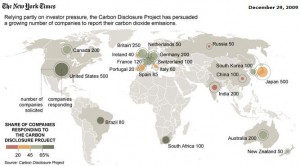I know there are still a lot of people who think global warming is a hoax, either because they think the world would be heating up with or without us, or because they simply believe it’s not actually happening. Irrespective of whether they (and I do mean “they”) are right, an article by Leslie Kaufman in The New York Times today called “Emissions Disclosure as Business Virtue” gets to something that makes a lot of sense as a call to action for organizations everywhere.
 The article talks at length about an organization called the Carbon Disclosure Project, a UK-based nonprofit that collects data about the carbon footprint of organizations all over the world from large manufacturers to financial services firms. The data is then used to help understand the carbon footprint of geographic regions, but more importantly it is being used for comparative purposes to show other companies in similar lines of work to highlight who has a best practice that others might employ to reduce their own carbon emissions, which usually means cost reduction. Why do I think this is so useful and important? Is it because I have started bleeding green like so many other people hell bent on saving the planet from, well, us?
The article talks at length about an organization called the Carbon Disclosure Project, a UK-based nonprofit that collects data about the carbon footprint of organizations all over the world from large manufacturers to financial services firms. The data is then used to help understand the carbon footprint of geographic regions, but more importantly it is being used for comparative purposes to show other companies in similar lines of work to highlight who has a best practice that others might employ to reduce their own carbon emissions, which usually means cost reduction. Why do I think this is so useful and important? Is it because I have started bleeding green like so many other people hell bent on saving the planet from, well, us?
No.
I think this is important because like so many things I talk about in the book Rethink, companies are stuck in all sorts of “how” traps, mistakenly thinking it matters “how” they accomplish many of the outcomes needed to be completed for them to do what they do. As I have shown time after time after time, the “how” rarely matters. People have come to accept this with something like Payroll, where someone has to do it and it has to be done right with few mistakes, but these days, especially in the US, no one cares who does it, how it gets done, or what technology is used as long as it’s done.
So with the Carbon Disclosure Project, organizations can now get all sorts of metrics for everything from how much electricity is used to run data centers (an example Kaufman cites in talking about Boeing) to how much gunk gets emitted into the air from a smokestack. With concrete metrics, people can see who has better numbers for something that is the same or similar to what they are doing, and if they want to look into whether those better metrics are also more cost effective, then they can pursue that. Kaufman points out “Some American companies have argued that reporting is cumbersome and could allow competitors to learn too much about their manufacturing processes.” I think this is nonsense for two reasons:
1) They are only getting metrics on the “outcome” of the work, exposing “how” it’s done, the process, is up to the organization to decide
2) Since only 5%-15% of “what” goes on in an organization is what makes them unique and drives their brand, the odds that “how” they arrive at their carbon footprint are part of that 5%-15% are by definition, very low.
So this is a good thing. More metrics will drive more cost effective management of all sorts of organizations, and there will be more green all over the world. Oh, and the environment will benefit as well.
-Ric
Leave a Reply